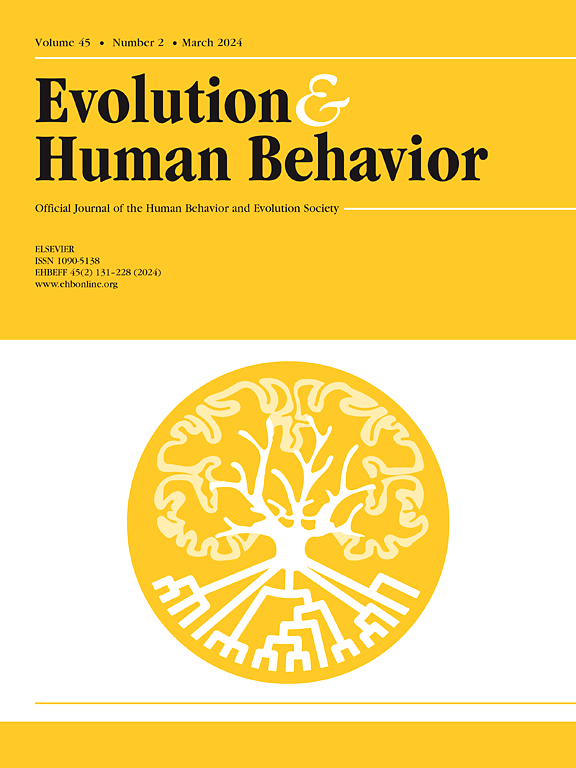Bismarckian welfare revisited: Fear of being violently dispossessed motivates support for redistribution
IF 3.2
1区 心理学
Q1 BEHAVIORAL SCIENCES
引用次数: 0
Abstract
Resource transfers among individuals can be driven by selfish, altruistic, competitive, or prudential motives. Here, we focus on prudence, specifically the propitiation of aggressive individuals or coalitions to avoid injurious loss. Across the animal kingdom, choosing to cede a resource to a stronger or needier individual is often more advantageous than losing the resource while also being harmed in the process. If the modern human skull houses a Stone Age mind, this ancient motive—though perhaps irrelevant in modern societies with legal enforcement of property rights—might still be at work. In domestic politics, the game-theoretic logic of appeasement is encapsulated in the quip, “If there is to be revolution, we would rather make it than suffer it,” attributed to Otto von Bismarck, the father of the modern welfare state. Are people intuitive Bismarckians? Across three studies in the United Kingdom and the United States—two with nationally representative samples and one preregistered (total N = 1911)—we observed robust associations between fear of being violently dispossessed and support for progressive redistribution. These associations were substantial and persisted even after controlling for other motives previously linked to redistribution, including self-interest, compassion, malicious envy, coercive egalitarianism, and proportionality, as well as political orientation. By elucidating the psychological mechanisms underpinning resource transfers, these findings advance our understanding of why individuals support redistribution in complex societies.
重温俾斯麦式的福利:对暴力剥夺的恐惧促使人们支持再分配
个人之间的资源转移可能受到自私、利他、竞争或审慎动机的驱动。在这里,我们关注的是谨慎,特别是安抚攻击性的个人或联盟,以避免伤害性损失。在整个动物王国中,选择将资源割让给更强大或更有需求的个体通常比在失去资源的同时受到伤害更有利。如果现代人的头盖骨拥有石器时代的思维,那么这种古老的动机——尽管在现代法律强制执行产权的社会中可能无关紧要——可能仍然在起作用。在国内政治中,姑息政策的博弈论逻辑被归结为一句俏皮话:“如果要发生革命,我们宁愿制造革命,也不愿忍受革命。”这句话出自现代福利国家之父奥托•冯•俾斯麦(Otto von Bismarck)之口。人们是直观的俾斯麦人吗?在英国和美国的三项研究中——两项具有全国代表性的样本和一项预先登记的样本(总N = 1911)——我们观察到对暴力剥夺的恐惧和对渐进式再分配的支持之间存在强烈的联系。即使在控制了之前与再分配相关的其他动机(包括自利、同情、恶意嫉妒、强制性平均主义、比例以及政治取向)之后,这些关联仍然是实质性的,并且持续存在。通过阐明支持资源转移的心理机制,这些发现促进了我们对复杂社会中个人支持再分配的原因的理解。
本文章由计算机程序翻译,如有差异,请以英文原文为准。
求助全文
约1分钟内获得全文
求助全文
来源期刊

Evolution and Human Behavior
生物-行为科学
CiteScore
8.30
自引率
9.80%
发文量
62
审稿时长
82 days
期刊介绍:
Evolution and Human Behavior is an interdisciplinary journal, presenting research reports and theory in which evolutionary perspectives are brought to bear on the study of human behavior. It is primarily a scientific journal, but submissions from scholars in the humanities are also encouraged. Papers reporting on theoretical and empirical work on other species will be welcome if their relevance to the human animal is apparent.
 求助内容:
求助内容: 应助结果提醒方式:
应助结果提醒方式:


